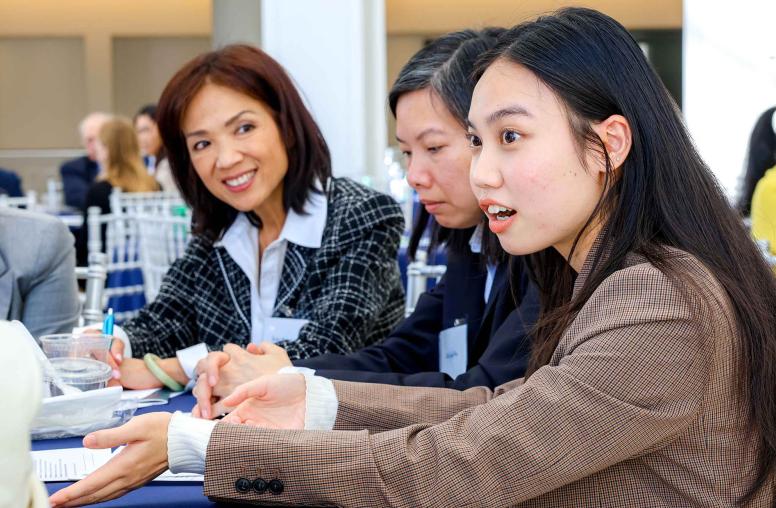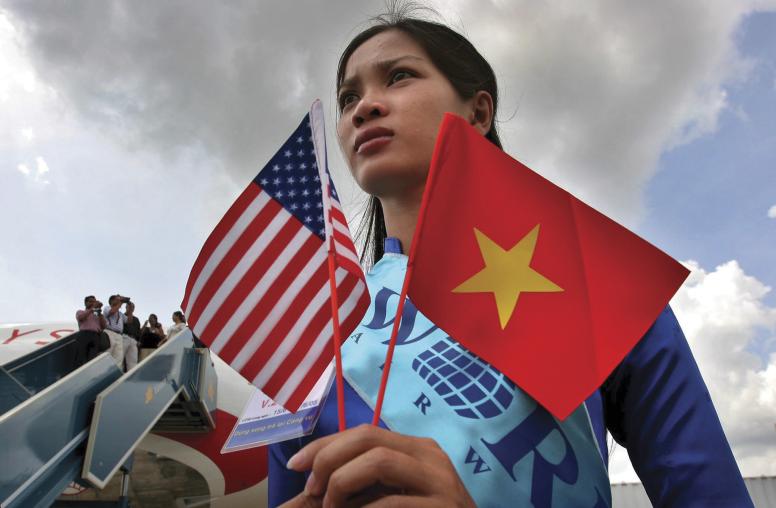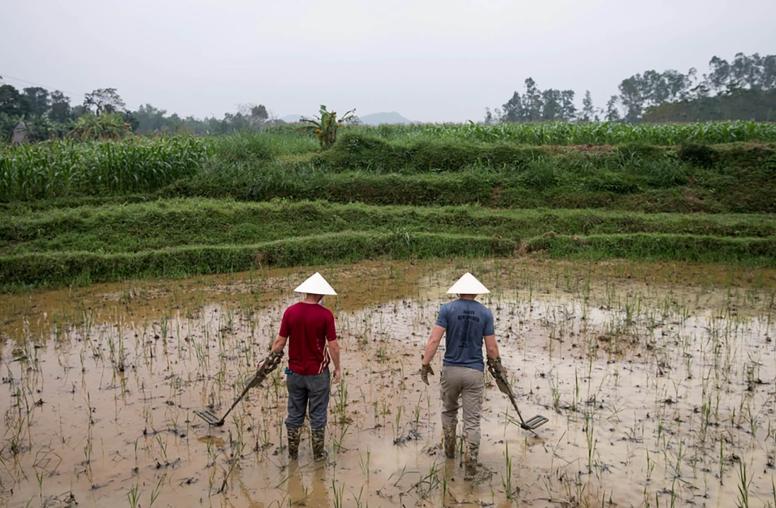We Can Heal War’s Traumas; U.S. and Vietnam Show How
50 years after a peace accord that wasn’t, one-time enemies salve a long war’s wounds.
This winter marks 50 years since U.S. and Vietnamese diplomats in Paris ceremoniously signed “peace accords” that did not end the Vietnam War, but that achieved America’s withdrawal from it. Thus, the accords permitted, a half-century later, what is now a durable American-Vietnamese reconciliation. In the face of seemingly intractable wars — in Ukraine, Afghanistan, the eastern Congo basin, Yemen or elsewhere — the growing U.S.-Vietnamese relationship shows that even a peace that seems impossible today can indeed be built for our children.

The formally titled “Agreement on Ending the War and Restoring Peace in Vietnam” achieved neither goal, historian Carolyn Eisenberg noted in a recent public discussion at USIP. Rather, it “was an agreement to cover U.S. withdrawal … in what was thought to be a face-saving way.” The accord produced the return to America of U.S. troops and prisoners of war — and two more years of combat before North Vietnamese forces defeated the U.S.-allied South Vietnam. After fighting ended, the United States and Vietnam needed 20 years, until 1995, to open normal diplomatic relations. “We may have started a bit late,” former U.S. Ambassador John Negroponte noted in the USIP panel discussion, but “we have certainly come a long way” in rebuilding U.S.-Vietnamese relations.
Reconciliation From the Grass Roots
“The seeds of U.S.-Vietnamese reconciliation were planted not so much by governments as by ordinary people who had in one way or another directly suffered the traumas of the war,” notes Andrew Wells-Dang, who leads USIP’s peacebuilding initiative between the United States and Vietnam. “These early workers for reconciliation included military veterans who served in the war, and Vietnamese whose families suffered division and displacement to America.”
One such initiative arose among injured veterans of the war. John Lancaster, a lawyer who had been shot and disabled as a young Marine lieutenant in 1968, moved from Washington to Hanoi in the 1990s to support disabled Vietnamese veterans and a U.S.-based nonprofit group, Vietnam Assistance for the Handicapped, in building Vietnamese projects to help disabled people find training, jobs and support. An astonishing symbol of what is possible, Lancaster recounted, is that one of his main Vietnamese partners, Manh Tuan, turned out to have been shot and disabled in the same battle, 25 years earlier.
Reconciliation from the grass roots has seen Vietnamese Americans return to Vietnam to teach in schools or provide medical assistance organized by civil society groups. One challenge in such efforts is the lingering mistrust between Vietnam’s Communist Party-led government and the many Americans of Vietnamese descent whose families fled the country after the war. USIP supports efforts among Vietnamese Americans and the U.S. and Vietnamese governments to promote healing on all sides from the continued losses inflicted by the war. Vietnamese American history professor Lien-Hang Nguyen emphasized the particular value of building reconciliation “between Vietnamese abroad and Vietnamese in-country.”
A powerful spur to the countries’ relationship has been business and trade, fueled by Vietnam’s shift from a centrally planned to a free-market economy. The United States in recent years has been Vietnam’s biggest export market. Vietnamese people’s economic aspirations seem to have helped improve their views of America, analysts say. By 2017, a Pew Research Center survey found 84 percent of Vietnamese expressing favorable views of the United States, while similar, lopsided majorities in recent years favor free-market economies.
After 50 Years, a Broader Path
From their reopening of diplomatic relations in 1995, the two countries have built a “comprehensive partnership” that works on economic and security matters, culture and education, and problems left over from America’s longest war of the 20th century.
“The spirit of shelving the past and working together toward the future in the reconciliation and expansion of the Vietnam-U.S. relations has become an example for parties in the aftermath of wars and conflicts,” Vietnamese Ambassador Nguyen Quoc Dzung said at USIP. “We have gone from foes to friends as we step-by-step fostered mutual understanding, reconciliation and strengthening cooperation.”
“Governments can reconcile, but really, you need people to reconcile for the process to be complete,” former U.S. ambassador to Vietnam Ted Osius said at another USIP workshop to advance reconciliation. In healing wars’ wounds, “it’s really important to be … brutally honest about the past, and it’s really important to do things together,” Osius said. “When you do things together … that brings trust and creates a new kind of relationship.”
Recovering the Lost
The United States and Vietnam recently intensified their “doing together” on the most emotive problem from the war —recovering lost remains of those killed fighting it. In 2021, Congress reciprocated Vietnam’s longstanding help in locating and repatriating remains of hundreds of American soldiers, launching a U.S. initiative to help Vietnam find the graves of hundreds of thousands of Vietnamese soldiers.
Vietnam Veterans of America has provided documents and recollections from U.S. veterans that have helped find remains of about 1,300 Vietnamese. Other American veterans have returned to Vietnam, some in missions supported by USIP, to help find sites where their units buried Vietnamese troops amid the war. USIP convenes dialogues among U.S. and Vietnamese officials, Vietnamese Americans, civil society groups and veterans to advance those and other efforts at U.S.-Vietnam reconciliation:
- Reducing threats from Agent Orange. The United States has provided funds and technology to clean up two airports where soil was severely contaminated by the United States’ wartime use of the defoliant Agent Orange. U.S. forces sprayed wide areas of Vietnam with the herbicide to strip away forest cover and crops used by its enemy. The Vietnamese Red Cross estimates that 3 million Vietnamese suffer cancers, birth defects or other ills from the resulting dioxin poisoning. The United States has framed with Vietnam a 10-year cleanup plan that could cost $450 million — and has provided $147 million to help people with disabilities. But the funds so far for helping Vietnamese victims remain inadequate and the United States and Vietnam still are working on how to get vital services to those most in need.
- Clearing land mines and other explosives. Since the 1990s, American veterans have worked to help Vietnamese clear unexploded land mines, cluster bomblets and other weaponry that has killed or maimed more than 100,000 Vietnamese since the war. Army veteran Chuck Searcy returned to help the province of Quang Tri, which he calls “the most heavily bombed area in the history of warfare,” build an explosives clearance system that reduced casualties from two per week to almost zero. The U.S. and Vietnamese governments, too, have boosted their formal cooperation on clearing unexploded ordnance.
- Shared education. More than 30,000 Vietnamese students now study at universities and schools in the United States, Ambassador Dzung noted. The U.S. and Vietnamese governments, U.S. universities and nonprofit groups are supporting modernization of Vietnam’s main universities and the establishment of a private university, Fulbright University Vietnam. Early this year, the first U.S. Peace Corps volunteers in Vietnam began teaching English in high schools in several cities.
Work To Do
The United States and Vietnam share interests and pressing problems, including security and conflict prevention in Asia. Both must manage rivalries with China, for example, as they resist Chinese territorial claims over the South China Sea (or, as Vietnamese call it, the “East Sea”). Both will benefit from helping Vietnam manage its vulnerability to climate change and tensions over Southeast Asia’s sharing of the Mekong River.
Building a stronger, perhaps strategic, partnership to better confront such problems will be based on further cooperation to overcome remaining “war legacy” issues such as the continued damage to Vietnamese people’s lives and bodies from dioxin poisoning, and to strengthen dialogue on challenging topics such as human rights and inclusive governance.
“Vietnam and the United States have been building an example for the world of reconciliation after a traumatic war, and our next steps are partly to just do more of what we’re already doing,” said Wells-Dang. “First of all, that means sustaining our dialogue, leading with listenership by all sides, as we move from dealing with the relatively simpler issues to the toughest ones. But it’s worth the effort, not only for more than 400 million people of our two countries, but for the billions of people worldwide who can use the examples and lessons of our successes to build peace from the wreckage of wars elsewhere.”




